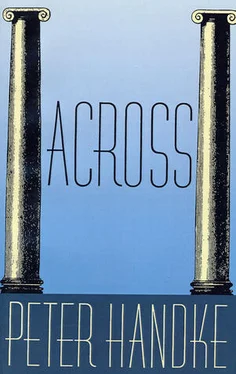Peter Handke - Across
Здесь есть возможность читать онлайн «Peter Handke - Across» весь текст электронной книги совершенно бесплатно (целиком полную версию без сокращений). В некоторых случаях можно слушать аудио, скачать через торрент в формате fb2 и присутствует краткое содержание. Год выпуска: 2000, Издательство: Farrar, Straus and Giroux, Жанр: Современная проза, на английском языке. Описание произведения, (предисловие) а так же отзывы посетителей доступны на портале библиотеки ЛибКат.
- Название:Across
- Автор:
- Издательство:Farrar, Straus and Giroux
- Жанр:
- Год:2000
- ISBN:нет данных
- Рейтинг книги:3 / 5. Голосов: 1
-
Избранное:Добавить в избранное
- Отзывы:
-
Ваша оценка:
- 60
- 1
- 2
- 3
- 4
- 5
Across: краткое содержание, описание и аннотация
Предлагаем к чтению аннотацию, описание, краткое содержание или предисловие (зависит от того, что написал сам автор книги «Across»). Если вы не нашли необходимую информацию о книге — напишите в комментариях, мы постараемся отыскать её.
Across — читать онлайн бесплатно полную книгу (весь текст) целиком
Ниже представлен текст книги, разбитый по страницам. Система сохранения места последней прочитанной страницы, позволяет с удобством читать онлайн бесплатно книгу «Across», без необходимости каждый раз заново искать на чём Вы остановились. Поставьте закладку, и сможете в любой момент перейти на страницу, на которой закончили чтение.
Интервал:
Закладка:
Peter Handke
Across
The Viewer Is Diverted
Ishut my eyes and out of the black letters the city lights took shape. Not the lights of the Old City, but the streetlamps that had just gone on in one of the many housing developments on the southern periphery. The development, consisting of two-story single-family houses, is situated on the big plain at the foot of the Untersberg. Long ago, this plain was a natural reservoir; then it silted up and became swampland — there are still swampy patches and ponds — and today it is known as the Leopoldskroner Moos. At first the streetlamps barely glimmer, then they flare up with a pure white light. By contrast, the arc lamps affixed to concrete poles at the eastern edge of the development, where a turnaround marks the end of the bus line, glow reddish-yellow. Between the bus terminus and the development lies a canal dating from the Middle Ages, fed by the Königsee and by one of the Untersberg brooks; this is the Alm Canal, the “noble Aim.” The development lies right outside the city limits (just before the entrance, there’s a sign with a diagonal line through the word “Salzburg”); it’s called the Oak Tree Colony. All the streets take their names from trees: Alder Street, Willow Street, Birch Street, Fir Street. Only the road coming from the virtually uninhabited peat bog in the west has kept its old name: Cider Press Road. And within the development there are still a few of the old peat cutters’ huts, some fallen into decay, some used for other purposes.
A trolleybus turns into the circle — a long, articulated vehicle. People get out, schoolchildren, locals, foreigners (who occupy the few wooden houses); all are in a hurry, only the children dawdle. They make their way in a cluster across the little canal bridge, followed by a few teenagers on their bicycles, which they left at the bus stop this morning. All together, they enter the Colony, which was almost deserted only a moment before and now suddenly seems inhabited. Dogs run barking to the garden gates. The phone booth at the edge of the Colony, which just now was dimly lit and empty, is darkened by phoners and people waiting to phone.
It’s not dark yet. Throughout the city, the lights have as usual come on early. In the dip in the horizon between the Untersberg to the south and the Staufen to the west, there are orange-colored stripes. On the crest of the Untersberg, which is ordinarily dark at this hour, the cliffs glitter in triangular patches. Over the scree basin, below the peak, the last funicular is on its way down. The Staufen, farther away, beyond the German border, is blue-black; only the limestone furrows on its upper slopes are a lighter color; on the summit, the light of a mountain hut flickers. Actually there are two summits, the “big” and the “little” Staufen; as seen from the city, a few miles to the north, the distance between them is apparent. But here on the Moos one mountain is standing directly in front of the other, and the two together form a single pyramid that has no neighbor for a long way around. The summit of the Gaisberg stands similarly alone in the east. Except that, instead of being a pyramid, it’s rounded, wooded, and topped with a plateau instead of a peak. On this side, the first star corresponds to the light in the hut on the Staufen. At the foot of the Gaisberg, just after the barren peat soil gives way to fertile loam, the Salzach flows in the failing light. There on the riverbank, not far from the boulder known as the Urstein, I once met a man who, with a glance at the slightly overhanging cliff and the caverns in it, said: “The world is old, isn’t it, Herr Loser?”
With the light of that moment, silence fell. The warming emptiness that I need so badly spread. It was a brightening, a primordial rising, so to speak. My forehead no longer needed a supporting hand. It wasn’t exactly a warmth, but a radiance; it welled up rather than spread; not an emptiness, but a being-empty; not so much my being-empty as an empty form. And the empty form meant: story. But it also meant that nothing happened. When the story began, my trail was lost. Blurred. This emptiness was no mystery; but what made it effective remained a mystery. It was as tyrannical as it was appeasing; and its peace meant: I must not speak. Under its impulsion, everything (every object) moved into place. “Emptiness!” The word was equivalent to the invocation of the Muse at the beginning of an epic. It provoked not a shudder but lightness and joy, and presented itself as a law: As it is now, so shall it be. In terms of image, it was a shallow river crossing.
The emptiness became peopled with figures. On the darkening street of the Colony, a young girl in baggy blue trousers was walking straight into the last yellow glow in the sky. An older woman on a bicycle turned in from a side street, holding a full milk can in one hand (there are a few isolated farms in the bog). An old man was walking from his house to his garden gate and back, changing his glasses on the way out and feeling his pulse on the way back. As usual, the wind was from the west. It had come up strong in the late afternoon but now had dwindled to a soft breeze. Different varieties of trees grew one behind the other in the gardens; some of their branches swung from side to side, others up and down, so that in time one got an impression of uniform motion, perhaps of a loom or of saw blades. In one corner of my room a ball of dust lit by the floor lamp moved about, and in the sky a vapor trail drawn by a blinking metallic pencil flashed in the sun. At the bottom of the canal, clumps of moss drifted about. Out in the bog, a herd of deer jumped across a drainage ditch.
I live in two rooms in the development’s only apartment house, situated just behind the canal bridge. The house was built in the decade after the war and is only three stories high; there’s no elevator and no balcony. The ground floor is occupied by a supermarket. There’s no other store in the vicinity. When I moved here, someone told me that, when asked for my address, the people at home said, “He’s living at the last stop of the No. 5 line, upstairs from the SPAR.” (This information, however, was not provided by my wife or children but by a neighbor woman.) My two rooms are indeed on the second floor, and sometimes at night I hear the vibration of the freezers downstairs. One of the rooms faces east, toward the canal and the bus stop, right behind which begins the level part of the Morzg forest, consisting mainly of dark spruce and underbrush; the other room has one window on the west and another on the north side; this last has a view of the city. From the Moos just then, all one could see of Salzburg was hidden by the so-called city mountains, the Festungsberg, the Mönchsberg, and the Rainberg; on their summits, one could see blinking ruby-colored warning lights. Though only a few miles distant, Salzburg seemed a long way off, because the thinly populated plain and the city mountains lay in between. The city mountains looked like mere hills, barely perceptible humps, and it was hard to imagine that they consist almost on every side of rather imposing cliffs, a fall from which means certain death. At the edge of the Old City, only a scattering of tourist buses were parked — there are long files of them during the day — and as the squares emptied of people, the gushing of the fountains became more audible. Not so long ago, all the city’s fountains got their water from the Alm Canal, which at present drives one or two mills but is otherwise largely ornamental; there are plans to close it down entirely. The domes of the churches glittered copper-green in the evening light.
The fountains were turned on again only a few days ago. During the winter, they are covered with wooden scaffolding, and the most one can see through the cracks is the whitened eyes or nostrils of a stone horse.
Читать дальшеИнтервал:
Закладка:
Похожие книги на «Across»
Представляем Вашему вниманию похожие книги на «Across» списком для выбора. Мы отобрали схожую по названию и смыслу литературу в надежде предоставить читателям больше вариантов отыскать новые, интересные, ещё непрочитанные произведения.
Обсуждение, отзывы о книге «Across» и просто собственные мнения читателей. Оставьте ваши комментарии, напишите, что Вы думаете о произведении, его смысле или главных героях. Укажите что конкретно понравилось, а что нет, и почему Вы так считаете.












